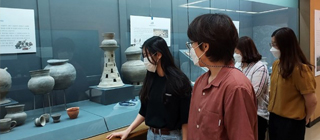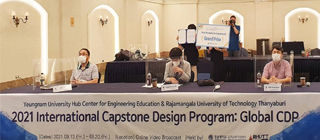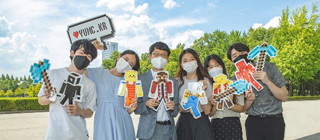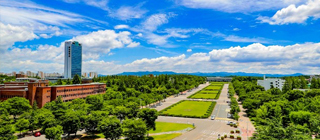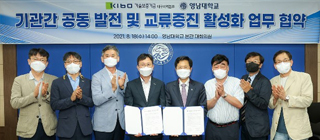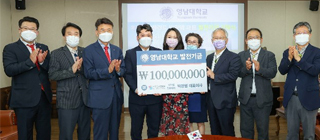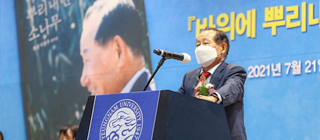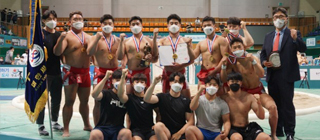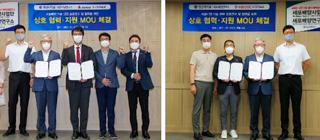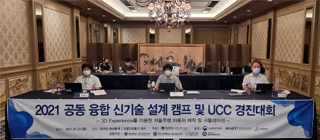-
Global attention on 40 years of research on the ‘Imdang Remains’ in the ancient Gyeongsan region Inter-disciplinary research in history, anthropology, medicine, and natural science sectors Videos containing important contents from the special exhibit to be produced as a creative animation and unveiled via YouTube [September 1, 2021] YU (President CHOI Oe-chool) will hold the ‘Imdang Excavation and World of Archeology’ special exhibit (9/1 - 11/30/2021) that explains the society such as the life and death of people in ancient Gyeongsan through an archaeological approach as the second semester begins. YU Museum has continuously excavated and examined historical site 516 Gyeongsan Imdan-dong and the Joyeong-dong Ancient Tombs since 1982. Various investigative institutes also participated since the 1990s for full-fledged investigations, and massive excavations were conducted in Imdang-dong and its vicinity. In result, it was possible to procure huge amounts of archaeological materials making it possible to restore the ancient society of the Gyeongsan area. Excavations in the Imdang area are still ongoing. It has been 40 years since YU Museum began excavations at Imdang Remains, and as inter-disciplinary research encompassing archeology, history, anthropology, medicine, and natural science, work on restoring the daily life of people in ancient Gyeongsan began in earnest. In the center of this was YU Museum. In particular, the research achievements based on the latest DNA analysis methods received global attention. This special exhibit summarized and introduced various research achievements made up until recently focusing on the excavation of the Imdang ancient tomb remains that our museum has led for a long time. It arranged the features and meaning of various artifacts such as iron items and accessories, as well as earthenware that is always a part of archaeological studies. Furthermore, it will provide a comprehensive introduction on the analysis and research achievements of ancient human skeletons and animal remains that were conducted over the past few years. Various analysis results made possible by the latest technologies are introduced. More importantly, the main contents of the special exhibit will be produced in six videos and two creative animations for people having difficulty visiting due to COVID-19 and it will be revealed through various online media such as the YU YouTube channel every Wednesday starting on September 8. YU Museum Director Jung In-sung, who oversaw this exhibit, said, “YU Museum is striving to hold exhibits that clarify its identity as a university museum of the region. In-depth research was conducted on the ancient human skeletons and natural artifacts of the ancient Imdang remains through this project for investigating Imdang Remains that represent Apdok. This is quite rare anywhere in the world. The achievements made here will contribute greatly in researching the living history of the ancient people of Apdok.” He added, “I hope that many people will visit YU Museum or see the special exhibit in cyberspace.” This special exhibit was held with funding from the ‘2021 Korean University Museum Promotion Support Project’ hosted by the Korean Association of University Museums and sponsored by the Ministry of Culture, Sports and Tourism. YU Museum has also been conducting the ‘Apdok Cultural Heritage Research Utilization’ project sponsored by Gyeongsangbuk-do and Gyeongsan for three years since 2019. Basic analysis of ancient skeletons stored at the museum was conducted, and the study is being carried out by applying the latest science technologies such as DNA analysis by collaborating with various research institutes both in and outside of Korea. It has become possible to get a more vivid look into the lifestyles of the people of Apdok. This year, analysis on the Imdang-dong animal remains collected by the YU Museum will begin in earnest.
-
-
YUMC of YU joined by various majors such as philosophy, computer engineering, visual design, etc. to quickly build a ‘metaverse campus’ ‘Expertise/creativity’ beyond a college club level... Pursued ‘metaverse project’ after receiving proposal from LG Electronics Hold various interactive meetings and events such as admissions ceremony and military send-off ceremonies... Space to form ‘social relations’ for the MZ generation [August 11, 2021] <Members of the YU Metaverse Club, ‘YUMC (Yeungnam Univ. Minecraft Server)’> (From left to right: Park Gwan-gyu, Jang Seon-ah, Seo Seung-wan, Chae Si-eun, Lee Bo-gyeong, Kim Hyun-do) What can students majoring in completely different areas such as philosophy, computer engineering, chemistry, materials engineering, English language and literature, family housing studies, and visual design gather to do? The ‘YU Metaverse Campus’ created by various majors has been the talk of the town lately. The word metaverse is a combination of the word meta that means abstract and universe that represents the real world. It has recently become a global issue and has exhibited possibility of use in various sectors such as the industry. At the spotlight is the YUMC (Yeungnam Univ. Minecraft Server) club. They used ‘Minecraft (metaverse game of Microsoft)’, which is the representative platform for configuring metaverse, to build the YU campus. YUMC President Seo Seung-wan (24, master’s degree program in philosophy at the YU graduate school) said, “I felt bad over the loss of the value of communication and interaction within school due to the prolonging of COVID-19. I organized this club thinking that it would be nice to form a student community for engaging in interactive activities in the virtual space of Minecraft.” YUMC, which was founded in February, already has 300 members. The club members voluntarily cooperated and set up the YU campus in the real world exactly the same in metaverse. Starting with the Central Library that represents YU, major buildings such as the Student Hall, Outdoor Auditorium, Chunma Art Center, and International Exchange Center were constructed identically as that in reality. But they did not stop at just imitating the exterior of buildings on campus. The library reading room also has information known only among YU students such as the best restaurants on campus, tips for registering for classes, test information, etc., and actual individual students are freely visiting campus to enjoy campus life. It held admissions ceremonies and is also holding various meetings and events like military send-off ceremonies for students. <Metaverse campus constructed by YUMC (view of YU Central Library)> Lee Bo-gyeong, a senior majoring in English Language and Literature, said, “We held the new ‘21 freshmen admissions ceremony via metaverse in March of this year. We wanted to hold an admissions ceremony prepared by seniors of freshmen who did not get to have a proper admissions ceremony due to COVID-19. We worked day and night for about two weeks for the admissions ceremony to construct the interior of the Chunma Art Center and invited the new freshmen. Though not many new students were able to participate, it was a meaningful event to our YUMC clubs by holding the admissions ceremony, which is the first step to life in college, via metaverse.” As the COVID-19 pandemic continues to go on, students from ‘20 and ‘21, who had few opportunities to visit the real-world campus, have now become more familiar with the metaverse campus than the real campus. Park Gwang-gyu (sophomore, Family and Housing Studies) who enrolled to YU last year, said, “As soon as I was admitted, classes were offered online due to COVID-19, so I visited the YU campus constructed on Minecraft before visiting the actual campus. I visited various parts of campus in the metaverse, and I was surprised when I visited the actual campus because it was exactly the same as that in the metaverse.” YUMC should not be viewed as a club that simply follows trends. The metaverse industry says that it has gone beyond the level of college clubs that simply share hobbies. It recently received a proposal for a project from a conglomerate and successfully completed it. YUMC received an offer from LG Electronics to construct a metaverse for the in-company training program completion ceremony and to carry out the event. After two months, it successfully completed the project and received a plaque of appreciation from the company. The ‘metaverse admissions ceremony’ that was held by YUMC drew a lot of attention from metaverse communities and professional researchers, and YUMC was thus recommended to LG Electronics by a Korean metaverse expert. YUMC President Seo Seung-wan said, “It is not just a game for constructing a virtual space on an online environment. The MZ generation holds meetings and events here, and is creating social relations just like in offline worlds.” He added, “YUMC has just started but there are many members with different expertise. As it is a club where students with different majors voluntarily get together, there are many unique and creative ideas. Various events such as humanities lectures and campus tours can be held through the YU Metaverse Campus. I hope that we can come up with various programs to form social relations in the post-corona era by integrating the metaverse.
-
Scholarship association founded in 2003 mainly by alumni who were recipients of the ‘Saemaul Scholarship’ and supports academic work for students every year ‘Cheering for academics’ of juniors for 16th year... 248.5 million KRW in scholarships to 264 students [August 13, 2021] The YU Saemaul Scholarship Association (Chairman CHOI Oe-chool) delivered the 'academic scholarship’ to show support for their juniors at the YU Department of International Development and Saemaul Undong on the 13th. This scholarship was made by senior alumni out of love for their juniors in hopes that students will not suspend their studies and continuously work toward their dream despite the difficulties created by COVID-19, and this is the 16th year of this program. The YU Saemaul Scholarship Association was founded in 2003 mainly around alumni who studied with the support of the Saemaul scholarship in the YU Department of Regional Development (currently International Development and Saemaul Undong) to support the studies of younger students. Since its establishment, it has been offering scholarships to its juniors, and this year, it gave 13.5 million KRW in scholarships for a grand total of 248.5 million KRW given to 264 students. Last year, members including Chairman CHOI Oe-chool, donated additional scholarships to help students having difficulties with continuing their academics because of COVID-19, and scholarships were delivered twice last year in June and December. This scholarship was given to encourage current students at the YU Department of International Development and Saemaul Undong involved in producing videos for introducing their department. The YU Department of International Development and Saemaul Undong recently held its own ‘department introduction video contest.’ The purpose of this was to provide information about the department for future freshmen and parents interested in the Department of International Development and Saemaul Undong. At this contest, the ‘New Morning!’ team composed of Jeung Seung-pil (senior) and Ha Yoon-seok and Sung Jung-eun (sophomores) won the grand prize, while two teams such as ‘Fantastic New Country’ (Jeon Chi-moo, Han Seung-ah, Jung Ye-won, sophomores) and ‘Create New Earth’ (Park Joon-young, Park Joon-tae, Kim A-reum, juniors) won second place, and two teams such as ‘REA:CH (Ready to Challenge & Change)’ (Park Se-eun (senior), Lim Myung-jin (junior), and Sung Ye-bin (sophomore)) and ‘Sangjo’ (Kang Eun-soo (senior), Kwon Hyun-jin and Lim Joo-eun (juniors)) (total 6 teams) received participation awards, and thus received scholarships. The awarded works can be seen in the homepage of the Department of International Development and Saemaul Undong. Chairman CHOI Oe-chool (current YU president) said, “Students are the future of the university. I saw the passion and creativity of students through the contest and became convinced that the future of our university is bright.” He added, “I hope that using the scholarships created through the affection of their seniors will act as a catalyst for students to realize their potentials and work toward their dreams. Furthermore, I hope that everyone develops into people who can also return what they received to society to continue the legacy of their seniors who practiced sharing.”
-
Industry-academic cooperation for fostering customized human resources for the needs of public institutes and local industries Constructing a community development network through human and material exchange between institutes [August 18, 2021] YU and the Korea Technology Finance Corporation Daegu headquarters entered an MOU for fostering local human resources. This MOU ceremony was held at 2 p.m. on the 18th at the YU Main Hall 3rd floor conference room joined by YU Education Innovation Department Vice President Kim Jae-chool, LINC+ Project Team Leader Bae Cheol-ho, and Korea Technology Finance Corporation Daegu Headquarters Regional Director Lee Gwang-yeol. Through this MOU, YU and the Korea Technology Finance Corporation Daegu Regional Headquarters agreed to cooperate for ▲fostering outstanding human resources meeting the needs of public institutes and local industries ▲student exchange for public institutes and industries such as field work, internships, etc. ▲construction of a cooperation system customized for the society to realize urban regeneration, town communities, and social economy ▲joint pursuit of personnel exchange and networking among local universities, governments, public institutes and industries ▲construction of various cooperation networks for the mutual development of the community through personnel and materials exchange ▲and to carry out government-funded projects such as the regional leading university fostering project, industry-academic cooperating leading university fostering project customized to society, etc. YU Education Innovation Department Vice President Kim Jae-choo commented, “A university and local public institute is teaming up to foster local human resources,” and added, “The university will take the lead for not only developing the industry through human resources, but also to contribute to the growth fo the local society.”
-
Supporting international students from developing countries at the Park Chung Hee School of Policy and Saemaul Pursuing international development cooperation projects with international cooperation organizations in Africa through YU’s global network Presenting a new industry-academic cooperation model of universities-businesses-international cooperation organizations for ‘synergy effects’ [August 10, 2021] Megagen Implant President Park Gwang-beom donated 100 million KRW to YU (President CHOI Oe-chool) as development funds. At 11 a.m. on the 9th, Mr. Park Gwang-beom met with YU President CHOI Oe-chool and donated 100 million KRW expressing his wish to help with the development of the university. The development fund donated by Mr. Park will be used to support international students at the Park Chung Hee School of Policy and Saemaul. Mr. Park stated, “We have been maintaining good relations with YU through international development cooperation projects through the global network built by YU. The global human network possessed by the university was very helpful for us to continuously pursue health and welfare improvement projects in developing countries as a specialized medical technology company.” He added, “We will do our best to support the fostering of experts in Saemaul and international development that the YU Park Chung Hee School of Policy and Saemaul is aiming for.” The development fund donation was the result from the partnership in the international development cooperation project that is being pursued together with YU. Megagen Impact entered a trilateral MOU with YU and LVRLACC (Lake Victoria Region Local Authorities & Counties Cooperation), which is an international cooperation organization of three African nations back in 2018. This MOU was made possible through the global network built by YU, and it drew great interest from society as a new type of industry-academic cooperation model in which a Korean university and company pursued international development cooperation projects together with international cooperation organizations. Megagen Implant, which possesses world-class medical technologies, is pursuing public health and welfare improvement projects in Eastern Africa. YU President CHOI Oe-chool said, “In addition to Megagen Implant, which possesses world-class medical technologies, pursuing international development cooperation projects, the fact that it is supporting the fostering of human resources in developing countries can have a great synergy effect for the company, university and developing country.” He added, “Starting with the passing on of knowledge in the Saemaul and international development sector that YU has accumulated, it is a model for a new type of industry-academic cooperation and a good example for expanding global exchange.” We hope that global exchange will grow to various fields such as society, economics and culture by utilizing the global network of YU. Korea has become the first country to be recognized by the UN Back on July 2 to have transitioned from the poorest country to a developing country, and now a developed country. I would like to once again thank President Park Gwang-beom of Megagen Implant who made the generous contribution to society at a juncture where we must now play a role fitting to a developed country.
-
Publication ceremony for <Pine Tree Rooted in Stone> held at the YU Chunma Art Center on the 21st “Value of life is determined not by ‘gathering’ but by ‘sharing’!” Entrepreneur who put into practice his beliefs for his entire life ‘Social spotlight’ on his life that practiced ‘social responsibility’... Used in regular courses at YU [July 23, 2021] “Value of your life is determined not by how you gather, but by how you share!” Lee Jong-woo, the chairman of Korea Former, who is a successful entrepreneur who overcame hardships in life and his thirst for learning through passion alone, is also a businessman who practiced his belief that life is determined not by ‘gathering’ but by ‘sharing’ throughout his entire life. His autobiography ‘Pine Tree Rooted in Stone’ that details his life was published. The title of his autobiography was named after his nom de plume ‘Songam’, which is translated into Pine Rock. The publication ceremony of his Chairman Lee’s ‘Pine Tree Rooted in Stone’ was held at the YU Chunma Art Center Convention Hall at 1.30 p.m. on the 21st. At the publication ceremony were present Yeungnam School Foundation Chair Han Jae-sook, YU President CHOI Oe-chool, YU General Alumni Association Chairman Jung Tae-il, as well as former governor of Gyeongsangbuk-do Kim Gwan-yong, former president of YU Lee Sang-cheon, and other noted figures from different parts of society who respected Chairman Lee to congratulate the publication. Other YU alumni who were unable to be attend due to protective measures against the spread of COVID-19 sent their congratulations through a video. President of the Yang Joon-hyeok Baseball Foundation Yang Joon-hyeok, Head coach of the Indonesian national football team Shin Tae-yong, and ‘Mister Trot’ singer Lee Chan-won also congratulated the publication via video. Scholarship recipients of the Songam Lee Jong-woo Scholarship Foundation also thanked and congratulated Chairman Lee. Chairman Lee was born in Japan in 1938 and returned to Gimcheon, Korea in 1946 after Korea gained independence, but soon lived through the Korean War spending his youth in pain and poverty. He did not receive official education, but had an undying passion for learning, and after being discharged from the Air Force and working as a civilian employee for the military in 1946, he enrolled at the YU College of Mechanical Engineering at the late age of 27. He packed two meals in the morning where he would eat one at work on the military base and the second one for dinner at school, and graduated after four years while working in the day and studying at night. Chairman Lee said, “It was a very hard time financially that I had trouble coming up with tuition. Whenever I think about my wife and children back then, it always pierces my heart. I thought a lot about whether I was being too selfish as the head of the family.” He added, “I was sorry to my children and I am filled with gratitude toward my wife who stood fast and protected our family. It was possible to publish this autobiography because of my wife and children who always supported me.” He said that the life he made was all thanks to his family. Chairman Lee founded Korea Former, which is a company that specializes in the production of lightweight steel frames and partition materials, back in 1977 and wrote his own story of success. He ceaselessly conducted research and technological development with the resolve that ‘though there may be failure, I will never give up’ and introduced new technologies in Korea to lead the localization of construction materials and the development of the industry. In the 1980s, his business took off by winning bids for the construction of the 63 Building, which was the tallest building in Asia at the time, as well as the LG Twin Tower building in Yeouido. Considering how hard his life was, it would seem natural for him to enjoy some luxury for himself, but even to this day, he drives a 10-year-old mid-sized car and it appears that he will never give up on the conviction that he had since he was young. “I never wanted to ride in a car driven by a chauffeur. I’m more comfortable and used to commuting driving myself or using the subway. I’m fine with living with just the amount I need. I am just thankful that my wife and children understands me.” But unlike being strict on himself, he is very generous when it comes to 'sharing.’ In 2019, he made news by donating real estate worth 5 billion KRW to his alma mater, YU. While serving as a director for the Yeungnam School Foundation, he witnessed the difficulties for renovating the Science Library, and then decided to donate a large sum as development funds for renovation costs. The YU Science Library has completed renovations and is preparing to welcome students. Chairman Lee also founded the ‘Songam Scholarship Association’ at YU in 2002 to help his juniors having difficulties with studies, where he has donated over 1.2 billion KRW in scholarships up to now. Outside of YU, he established the Songam Lee Jong-woo Scholarship Foundation where he delivered scholarship funds for high schools and colleges around the nation to help foster talented human resources. He was recognized for his contributions to the development of education in the Republic of Korea and last year, he received the honor of being awarded the ’Order of Civil Merit, Peony Medal’ from the government. A 260-page book is no way near enough to contain the entire life of Chairman Lee. But his life of practicing responsibility and a lifetime of sharing as a businessman seems more than sufficient to receive the limelight from society. “Having the company create profits and grow is in itself fulfilling as an entrepreneur. But the efforts of an entrepreneur should contribute to the nation as well. Creating jobs, contributing to the development of the local and national economy, and sharing the value created with the society you live in as a social responsibility is much more important.” Perhaps it is only natural for Chairman Lee who has such convictions to return the fruits of his success to society and to practice sharing. He says that he will continue to practice the act of sharing for the rest of his life just as he has done so for his past 80 years. The publication of his autobiography ‘Pine Tree Rooted in Stone’ might actually be a new declaration for the live of sharing that he will live in the future, rather than being an organization of his life so far. YU President CHOI Oe-chool attended the publication ceremony and stated in his congratulatory address, “I thought a lot while reading Chairman Lee Jong-woo’s autobiography. It was especially evident that the records of his life contained the entire history of the Republic of Korea. Korea, which was at one point the poorest country in the world, has now become a developed nation and is leading the development of developing countries, and his life is in close contact with it. I will do my best in education so that the spirit of ‘sharing, serving and creating’ that is imbued in the history of the Republic of Korea and the life of Chairman Lee can be passed on to the future generation/” Meanwhile, YU plans to use Chairman Lee’s autobiography in regular curricular classes. It aims at taking a look at the life of Chairman Lee who is a senior of YU and a socially respected businessman and to foster the second and third Lee Jong-woos by teaching his philosophy on life to his juniors.
-
Returns to the throne after two years by winning the college group tournament Sweeps medals in individuals with 1 gold, 1 silver, and 2 bronze medals [July 22, 2021] YU Ssireum Team that won the college group tournament at the 58th Korean Presidential Cup National Ssireum Championship (Photo source: Korea Ssireum Association) YU defeated Inha University 4-2 at the college group tournament held at the Jeongeup Citizen’s Sports Center in Jeongeup, Jeonbuk on the 20th to take first place. YU took the lead 3-0 with Seo Min-gyu (Sports Science, senior) winning in the Gyeongjang class (-75kg), Park Seok-ho (Special Physical Education, junior) in the Sojang class (-80kg), and Kim Gyeong-bae (Sports Science, senior) in the Cheongjang class (-85kg), and from the sixth match, Jung Jong-jin (Special Physical Education, junior) won in the Yongsa class (-95kg) to take the victory with a score of 4-2. Thus, the YU Ssireum Team once again took home the championship after two years since winning in 2019 at the Cheonhajangsa Ssireum Championship. The YU Ssireum Team also swept the college individuals held on the 21st. Kim Gyeong-bae took first place in the Cheongjang class, Lee Sang-yeon (Special Physical Education, senior) took second place in the Yongsa class, while Seo Min-gyu in the Gyeongjang class and Lee Hyeon-seo (Special Physical Education, sophomore) both took third place. YU Ssireum athletes awarded in the individual rounds (From left to right: Dispatch Coach Lee Yong-ho, YU Ssireum Team Lee Sang-yeon, Kim Gyeong-bae, Seo Min-gyu, Lee Hyeonseo, and Head Coach Heo Yong) YU Ssireum Head Coach Heo Yong said, “I am thankful to the athletes who trained hard without complaining despite the hot weather. I would especially like to thank Dispatch Coach Lee Yong-ho from the Gyeongbuk Ssireum Association who upgraded the individual capacities of the YU athletes.” He added, “I would also like to extend my appreciation to the advisors and employees who spared no support so that the athletes could train safely despite the difficult conditions. We will do our best to take advantage of our streak and continue to perform well.”
-
YU Research Institute of Cell Culture enters joint research agreement with specialized corporations such as Neo-Cremar and T-Ribose Pursuing localization research of core materials and technologies for ‘cell culture medium’ that depends completely on imports costing 400 billion KRW a year Requires government-academic-industrial cooperation to create new industries and lead the bio-industry [July 22, 2021] The bio industry research led by the YU Research Institute of Cell Culture (Chief Choi In-ho) will gain momentum in its technological commercialization. On the 21st, the YU Research Institute of Cell Culture entered joint research agreements for the development of core materials and technologies related to the cell culturing industry with two specialized companies such as Neo-Cremar (CEO Kim Jae-hwan) and T-Ribose (CEO Kim Yong-gwan). Neo-Cremar is the only functional food materials company in Korea listed in KOSDAQ. It is currently actively researching alternative meats and it is planning to launch vegan meat made with plant-based proteins. With this MOU, it plans to commercialized cultured meat through joint research with YU to pioneer not only the domestic market, but also overseas markets. T-Ribose is a newly established company aiming for the localization of cell culturing medium, and it is constructing a GMP (Good Manufacturing Practice; rules for manufacturing and quality management of pharmaceutical products, etc.) needed for producing cell culturing mediums in the Uiseong Bio Valley that is currently being constructed in Uiseong-gun, Gyeongbuk. Cell culturing technology is involved with growing animal cells outside of its body and it is a core technology used not only for basic research (basic life science, medicine, pharmacology, etc.), but is also used heavily by companies that produce biopharmaceutical products (antibody, vaccines, protein, stem cell medicine, etc.). The best-known case is the production of coronavirus vaccines using cell culturing by SK Bioscience, and in Korea, Samsung Biologics and Celltrion have the nation's largest culturing facilities needed for producing bio-medicine. In addition, if production of ‘cultured meat (meat produced by culturing muscle stem cells)’ that has recently become a big issue is realized in the near future, it is expected that the rate of cell culturing in the bio industry will grow. This is why the industry-academic joint research agreement between YU that has the nation’s best research and technological capacities in cell culturing and companies with expertise in relevant fields is gaining so much attention. Department of Medical Biotechnology Professor Choi In-ho, who heads the YU Research Institute of Cell Culture, stated, “The history of bio-industries in Korea is relatively short, but has made remarkable achievements. But ironically, compared to the scale of cell culturing facilities in Korea, it still depends almost completely on imports for actual cell culturing.” He added, “Especially in the case of ‘cell culturing medium’ that is basically the food for growing cells, the amount imported by Korea is about 400 billion KRW per year. It is expected that demand will grow with the development of the bio-industry in the future, but in reality, we are still importing most of the raw materials needed for producing mediums.” In order to lead the bio-industry, which is a cash crop for the future, assertive cooperation is needed from not only best-known universities and companies, but also the central and local governments.” Professor Choi has been planning various businesses for the construction of the domestic infrastructure, as well as in the development of core raw materials and technologies that are essential for cell culturing together with Gyeongsangbuk-do and Uiseong-gun since 2016. Professor Choi founded the Research Institute of Cell Culture that is joined by professors in medical biotechnology, food engineering, pharmacology, and chemical engineering as researchers back in 2017. The YU Research Institute of Cell Culture was selected as the ‘College Central Research Support Project in Science and Engineering’ by the Ministry of Education in 2020, and it will receive funding from the central and local governments for nine years until 2029, and is thus spurring its efforts to develop core technologies and materials needed for cell culturing. Professor Choi said, “The YU Research Institute of Cell Culture, Neo-Cremar and T-Ribose are developing exclusive mediums for cultured meat through joint research. The industry-academic-government cooperation will create new industries for the local society and it will serve as a hub for core materials and technology development of the domestic cell culturing industry.
-
‘Digital Twin’ technology-applied autonomous vehicle design and simulation contest held Sponsored by the YU Engineering Education Innovation Center and co-hosted by engineering education innovation centers of four major universities in Korea Constructing a collaborative education system between global companies and universities [August 4, 2021] The YU Engineering Education Innovation Center hosted the ‘2021 Joint Convergence New Technology Design Camp and UCC Contest.’ This contest, which was sponsored by the YU Engineering Education Innovation Center and co-hosted by the engineering education innovation centers of the Korea National University of Transportation, Hall University, and Hongik University, was the nation’s first joint convergence new technology design camp that used digital twin technologies to construct an education collaboration system and to design and simulate autonomous vehicles in cyber space. It was held in cyber space for a week from July 14 to 21 and the design contest was held at the Daegu Interburgo on July 22. This is the first time that multiple universities constructed an education and collaboration system in cyber space to provide engineering education for fostering human resources in autonomous vehicles, while hosting production contests. In this contest, an autonomous driving education platform produced using the ‘3D EXPERIENCE Academic Platform’ of the global digital twin company Dassault System and its affiliate Hana TS, and expert mentoring in digital twin engineering were utilized. Participants of the contest produced autonomous vehicles at a 1/10 size in cyber space using digital twin-based engineering. <Model of autonomous vehicle made using digital twin technologies (second place winner by the YU Team)> The grand prize went to the Halla Team (Bang Min-hyeok, Yeom Gwang-mo, Han Neul-chan) and the YU Team (Moon Jong-ho, Baek Yun-gyun, Yoon Do-hyun) won second place. Digital twin technology is an essential technology that has recently been used for producing autonomous vehicles, and it produces and tests the entire production process including product planning, design and assembly in a virtual environment, which can significantly reduce production periods and expenses. This technology has been reducing the production period of new vehicles by a year and a half. Through this education collaboration system, it is expected that students will be able to use digital twin technologies to continuously experience automobile engineering, simulation, and production processes, as well as autonomous driving and virtual tests through collaboration that is being emphasized in the new mobility sector. YU Engineering Education Innovation Center Director Kang Dong-jin (Professor of Mechanical Engineering) who hosted this event commented, “We constructed a collaboration system to provide direct education and experience for students in digital innovation and conversion through the collaboration of multiple universities and global companies. We will provide full support so that many students can experience the latest fourth industrial revolution technologies through continuous exchange and reach-out programs.”
